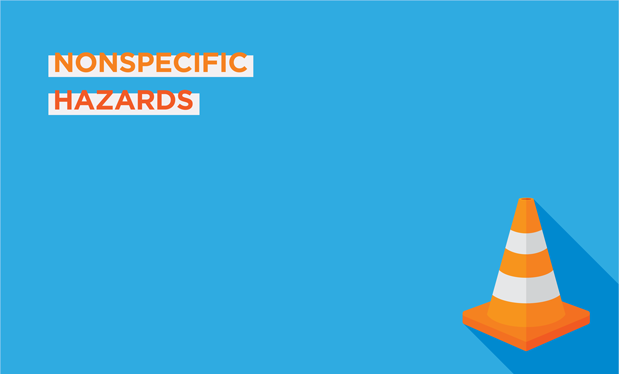Hawaiian roofing contractor cited for repeat violations
Hawaii Occupational Safety and Health (HIOSH) has cited Rui Construction Inc., Honolulu, for exposing employees to fall hazards, according to www.osha.gov. The company is not an NRCA member.
On Feb. 27, HIOSH inspectors observed four Rui Construction workers installing roof sheathing 20 feet above the ground without fall protection, as well as an employee with no eye protection using a rigid pneumatic nail gun. Rui Construction received citations for two repeat serious violations for failing to provide fall and eye protection and failing to conduct fall-protection training and one other-than-serious violation for failing to keep a log of worker injuries and illnesses. Proposed penalties total $102,313. HIOSH previously cited Rui Construction for similar violations in 2014, 2015 and 2017.
Rui Construction has 20 days from receipt of its citations and penalties to comply, request an informal conference with HIOSH's administrator or submit proper paperwork to begin the process of contesting HIOSH's findings.
Maine roofing contractor ordered to train employees, pay fines
After multiple investigations by the Occupational Safety and Health Administration (OSHA), the 1st U.S. Circuit Court of Appeals ordered Stephen Lessard, owner of Lessard Roofing & Siding Inc., Lewiston, Maine, and Lessard Brothers Construction Inc., Greene, Maine, to implement a comprehensive safety and training program after receiving repeated citations for exposing workers to falls, according to www.osha.gov. Lessard also was ordered to produce substantial documentation that will demonstrate the extent to which he is able to pay $389,685 in outstanding fines issued by OSHA. Neither company is an NRCA member.
OSHA cited Lessard Roofing & Siding and Lessard Brothers Construction for safety violations at 11 work sites in Maine between 2000 and 2011. Lessard failed to correct the cited violations, implement appropriate safety measures, and pay accumulated fines and interest despite being ordered to do so by the 1st U.S. Circuit Court of Appeals in December 2011. The court held Lessard in civil contempt for defying the 2011 order.
"The 1st circuit's order requires Lessard to ensure all workers at his worksites, whether his employees, employees of his subcontractors, or actual or putative independent contractors, are operating safely, after a long history of his failing to provide adequate protective measures," says Michael Felsen, regional solicitor of labor in Boston for the Department of Labor (DOL). "When necessary, as in this case, DOL will pursue appropriate measures so that employers do not flout the law or gain an unfair advantage over law-abiding employers."
The court also ordered Lessard to ensure employees and contractors use required safety equipment and fall protection; conduct work-site safety analyses and meetings; employ a "competent person" to ensure work is performed according to OSHA regulations; notify OSHA about each work site and allow inspectors to enter the work sites; provide financial documentation to enable DOL to determine the owner's ability to pay the fines; submit certification of abatement of the previously cited hazards; and comply with OSHA standards.
If Lessard fails to comply with the order, the court will consider additional sanctions up to and including incarceration.
Supreme Court bars worker class action lawsuits
On May 21, the U.S. Supreme Court ruled employers can force workers to use individual arbitration instead of class action lawsuits to press legal claims, potentially limiting the rights of tens of millions of employees.
In the 5-4 vote deciding Epic Systems Corp. v. Lewis, Supreme Court justices said for the first time a 1925 federal law lets employers enforce arbitration agreements signed by workers. The majority vote rejects contentions that a separate law guarantees workers the right to join forces in pressing claims.
Writing for the majority, Justice Neil Gorsuch said: "The policy may be debatable, but the law is clear: Congress has instructed that arbitration agreements like those before us must be enforced as written."
The ruling builds on previous Supreme Court decisions that let companies channel disputes with consumers and other businesses into arbitration. The most recent decision applies to wage-and-hour claims.
Arbitration supporters say forum is cheaper and more efficient than traditional litigation. Critics say companies are trying to strip individuals of important rights, including the ability to band together on claims that as a practical matter are too small to press individually.
About 25 million employees have signed arbitration accords that bar group claims, a lawyer for the workers in the case told the court. The workers said the National Labor Relations Act guarantees them the right to press claims as a group either in arbitration or in court, and a 1925 law protects "concerted activities" by workers without explicitly mentioning lawsuits.
However, the Supreme Court majority said the language wasn't specific enough to overcome a separate law, the 1925 Federal Arbitration Act, which says arbitration agreements must be enforced like any other contract.
DOL may issue joint employer liability and employee misclassification guidance

O'Scannlain |
The Department of Labor (DOL) may issue new guidance or rulemaking to clarify the Trump administration's views regarding joint employer liability and employee classification, DOL Solicitor Kate O'Scannlain said during a June 8 law conference at New York University. She did not clarify whether DOL may issue a new regulation or subregulatory guidance; subregulatory guidance does not require public input and can be published more quickly.
O'Scannlain made her comments in response to an inquiry from Bloomberg Law regarding whether her office would work with the Wage and Hour Division to replace two informal administrator's interpretations from the Obama administration. The Obama administration's Wage and Hour Division Chief David Weil wrote the memos: One stated most workers should be classified as employees rather than independent contractors who are exempted from federal wage-hour protections, and the other memo stated joint employer liability for affiliated businesses in wage cases should be read broadly. In 2017, Labor Secretary Alexander Acosta withdrew the memos because he identified them as new interpretations of the law that bypassed notice-and-comment rulemaking.
By acting to address the issues, DOL could offer new legal interpretations of when employers are jointly liable for wage violations and what constitutes misclassification of employees as independent contractors. In addition, DOL could provide much-needed clarity to businesses and workers currently subject to an array of legal standards.
Wisconsin roofing contractor cited for fall hazards
The Occupational Safety and Health Administration (OSHA) has cited Hector Hernandez, owner of Town City Construction, Appleton, Wis., for exposing employees to falls and other safety hazards at two job sites, according to www.osha.gov. Town City Construction is not an NRCA member.
On Nov. 30, 2017, OSHA inspectors observed Hernandez's employees working without fall protection on a steep-slope roof system at a residential job site, and on March 28, inspectors observed Hernandez's employees exposed to falls while working from improperly erected ladder jack scaffolds at a residential job site. In May, Hernandez received citations for one repeat and two willful violations for failing to provide fall protection, failing to train workers about fall hazards, improper installation of an extension ladder for safe use and failing to provide required ladder jack scaffold components. Proposed penalties total $120,320.
"Employers are required to provide fall protection to employees working in construction at heights above 6 feet," says Robert Bonack, OSHA's area office director for Appleton. "This employer's repeated failure to comply with federal safety requirements exposes employees to fatal injuries from fall hazards."
Hernandez has 15 business days from receipt of his citations and penalties to comply, request an informal conference with OSHA's area director or contest the findings before the independent Occupational Safety and Health Review Commission.
Supreme Court rules mandated union fees are unconstitutional
On June 27, the U.S. Supreme Court ruled public-sector "agency shop" arrangements mandating union fees from nonconsenting public-sector employees are unconstitutional.
In the 5-4 vote deciding Janus v. American Federation of State, County and Municipal Employees, Council 31, court justices found such arrangements violate the First Amendment. The case stemmed from a complaint filed by a child support specialist in Illinois who challenged the $45 monthly fee he was required to pay to the union that represents him though he is not a member.
Writing for the majority, Justice Samuel A. Alito Jr. said: "The First Amendment is violated when money is taken from nonconsenting employees for a public-sector union; employees must first choose to support the union before anything is taken from them. Accordingly, neither an agency fee nor any other form of payment to a public-sector union may be deducted from an employee, nor may any other attempt be made to collect such a payment, unless the employee affirmatively consents to pay."
The ruling will alter how public-sector unions function and may have implications for private-sector labor issues, as well. Critics warn unions will be weakened and workers' collective bargaining strength will be compromised if current members decide to leave their unions. Others argue the ruling will force unions to provide a better value provision to retain and attract members, rather than relying on forced fees, which could ultimately strengthen unions.



